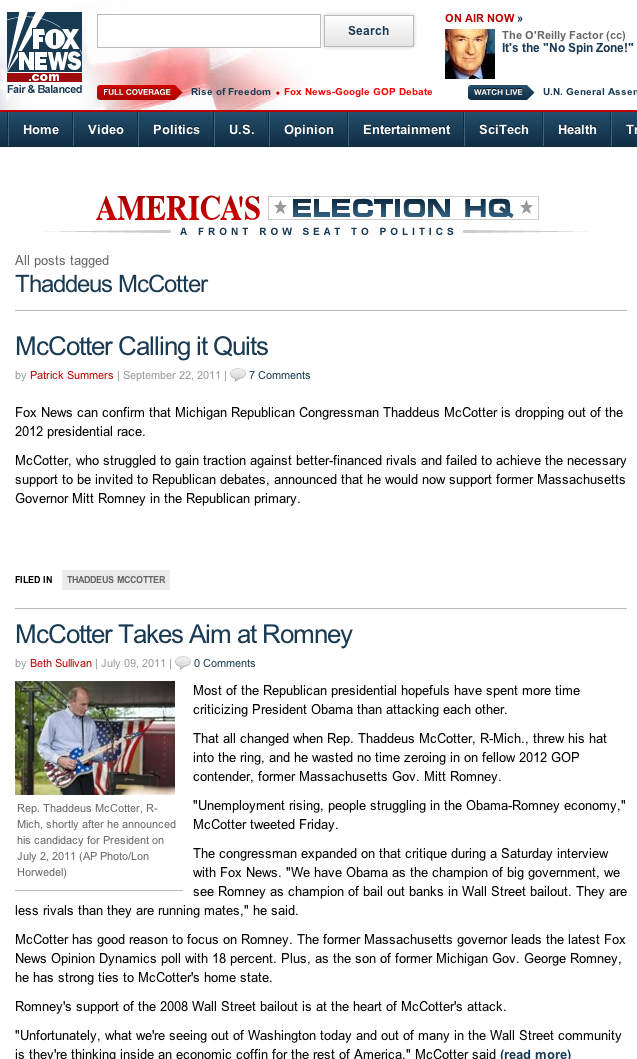Rick Perry came prepared with an attack on Mitt Romney that in Romneys book No Apologies, he claimed that he wanted the Massachusetts healthcare model to be adopted by the rest of the country, yet in the paperback edition this was deleted. While one specific line may have indeed been edited from the paperback, a scan of the original book proves that the context was unchanged and that Romney did not in fact advocate the whole country having MA-care foisted upon them. The book, provided by pro-Romney site WhyRomney.com instead says the opposite of what Perry claimed.

Reposted from WhyRomney, with permission:
Critics cite differences between the paperback and hardcover editions of Romney’s book, “No Apology,” accusing Mitt Romney of subtly changing positions on Obama’s policies to harden his stance for political reasons. However, critics falsely lead people to this conclusion by taking excerpts out of context. For instance, critics claim that Romney called Obama’s stimulus plan “a failure” in the paperback but not in the hardcover. The truth however is that Romney wrote the hardcover during the initial phase of the stimulus and thus could not yet claim that it had “failed,” or elaborate on the effectiveness of details which had not yet been implemented. But Romney specifically said on page 145 of the hardcover that Obama’s stimulus had “already been far less than successful,” and Romney predicted “it will impose a heavy burden on the economy in the intermediate and long term.”
Critics also fail to mention that on page 31 of the hardcover, Romney says “the record and achievement of modern free-market capitalism” is “now at risk because of the economic policies of President Obama.” Romney goes on to say, “His effort to expand the size, reach and role of government is without precedent in our history. His plans would leave us with a crushing deficit and debt, far beyond anything we have ever experienced.” Also on page 31, Romney writes that “at a time when Europe is moving away from socialism and its many failures, President Obama is moving toward that direction.”
Likewise, critcs claim that in the hardcover Romney promoted Obama’s stimulus on pages 144-145 as something that would “accelerate the timing of the start of the recovery.” But in fact, Romney’s statement was alluding to the limited tax cut portion of the stimulus, having put it in that context in the previous line which critics leave out, by statinSupremg that congressional Democrats fail to understand “the crucial role played by tax cuts.” It is in this context that Romney said the stimulus would not help “as much as it could have had it included genuine tax- and job-generating incentives.”
In a similar criticism, critics accuse Romney of being soft on Obamacare in the hardcover because in the paperback he stated that it should be “repealed,” but in the hardcover did not call for a “repeal.” The truth however is that Obamacare had not passed when Romney wrote the hardcover edition and its passing seemed less likely at the time because of the election of MA Senator Scott Brown. With no law to repeal, a call for repeal would have made no sense. Furthermore, Romney had no pressing need to discuss Obama’s health care ideas in extended detail.
UPDATE: Glenn Kessler in the Washington Post writes on this
In fact, while Romney has a reputation as a flip-flopper (which this ad tries to exploit), he has been consistent in saying he did not want to import his plan to the rest of the country. When the Massachusetts law was passed in 2006, he appeared on MSNBC and was asked whether it would work for the rest of the country.
“Well, it will work for Massachusetts, and that’s of course the thing that I had to focus on,” Romney replied. “There are certain aspects of it that I think would work across the country, perhaps better in some states than others. Of course the great thing about federalism is you let a state try it and see how it works before you spread it out.”
Romney made a similar point in an interview with Dan Balz of The Washington Post in 2007, as he recalled during last week’s debate. “Instead of having the federal government give us one-size-fits-all, everybody-must-follow-the-same-plan, let states develop their own,” he told Balz.
We closely compared the chapter on health care in the two editions so you don’t have to. Essentially, it is clear that the hardcover edition was written when Obama’s health-care plan was still a work in progress. For instance, Romney spends some time denouncing the idea of a public option as “government-supplied insurance.” The paperback was published after the health-care law was passed, so the paragraphs on the public option — which had been abandoned by Obama — are dropped.
The main point: Romney has long said he did not view his plan as a model for the nation, and he has not wavered on that stance.



